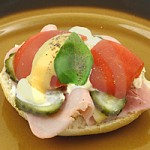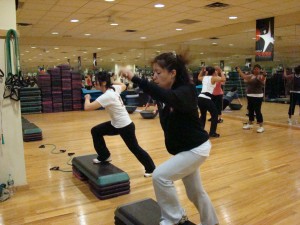by Michelle Sutton-Kerchner
Although winter is typically associated with weight gain, summer has its own opportunities to put on the pounds. Here’s to effective workouts, nutritious eating, and some cheat days …
Summer is a time for fresh produce and light meals. It’s also a time for ice cream, s’mores, and potato salad. Peppered with a change in routine– from vacations, summer schedules, and backyard celebrations—it may be an effort to maintain your nutritious diet and healthy fitness habits.
Many assume the increased physical activity of summer counteracts any food indulgences. Weight gain can be simplified by caloric intake versus burn. However, other factors interfere with this black-and-white equation. At any given time, do you know the amount of minutes (hours?) it takes, at what type of exercise, to burn off an ice cream sundae? Exactly. Our assumption of what qualifies as enough activity to burn off an indulgence often only cancels out the whipped topping.
All Things in Moderation
We try hard to keep our lives balanced. Just as too much work makes an unhappy camper (actually, no time for camping at all), too much junk food makes an unhappy body. Impromptu cookouts or runs for frozen custard are fun treats. Keep them treats by only enjoying on occasion. If you’re fidgeting for something different or a trip out of your own backyard, go to a park, take a brisk walk, or stop by the Center for a new Group Fitness class.

When approaching the picnic spread, use one of the dessert or snack plates for your meal. This allows you to sample a little of everything without overload. Divide your plate: half fruits and veggies (easy to do at summer fests), one-quarter protein, and one-quarter starches. A small plate is good for portion management. It’s also good for those whose eyes are bigger than their stomachs. With a full plate, albeit mini, you feel more satisfied mentally as well as physically.
With kids out of school, their favorite foods often fill your kitchen rather than their lunch boxes. They’re sure to share their fruit chews and Little Debbie processed cakes to your heart’s content. Don’t let their generous nature—which is also an opportunity for their own indulgence in the treat at hand—get the best of you. For your good and theirs, initiate healthy snacks. Have fresh fruit and chopped veggies at their eye-level in the fridge and pantry. Much of how we eat is nurture-based rather than nature. Make healthy eating habits one thing they’ll perfect this summer. Be the example.
Don’t feel the need to “do the dishes” before you hit the sink. Many parents admit to finishing off food left on their children’s plates. You ate your share and, hopefully, maintained portion control. Don’t overload by stuffing the stray breaded chicken nugget and cheesy macaroni into your diet after kids scoot from the table. Those post-meal forkfuls of kid food add up and are often highly caloric.
Allow yourself little indulgences throughout. If you know you’ll be going to a BBQ or other eating event, keep your choices light yet filling prior to arrival. Eat a protein-rich snack before leaving, such as peanut butter on whole wheat bread or crackers. If you don’t arrive hungry, you can make smarter choices at the buffet table. You also won’t fill up on dip and appetizers before the main meal, leaving more opportunity to indulge on nutritious options or the occasional grilled sausage sandwich.
Schedule in Cheat Time
Patrick Nardone, co-owner with wife Michele Vincent of Muscle Maker Grill, suggests building in a cheat day. Decide in advance when that day will be. By knowing treats aren’t deprived but delayed, you’ll be more successful at making healthy choices the rest of the time. Patrick and Michele break from the normal regimen on the weekend. They try to schedule any dining out for their cheat day. The rest of the week, they eat a diet low in fat, carbs, and sugars and high in protein.
Their four children follow similarly constructed diets, including their two teens and 21-year-old—the age group known for diets big on pizza and fast-food. At 16 years, their son is the “cleanest” eater of the family, who is diligent about label reading. Their 14-year-old daughter does not eat red meat. Although Patrick and Michele don’t adhere to these same restrictions, their example of healthy eating was adopted and adapted by their offspring. Surely, their 3-year-old daughter is off to a nutritious start, though they didn’t mention when her cheat day was.
Cheat day or not, the concept is a winner. To be successful, allow yourself the occasional cookie or side of potato chips. The first bite is always the most delicious, so maybe you only need a 5-minute cheat for a satisfying treat.
Be sure to schedule in diet-friendly time. This should be the majority of your eating. However, just as you allow yourself time to indulge, the rest of the time should be designated for nutritious eating. Even though you aren’t indulging in cheat foods, it doesn’t mean you’re eating well.
Schedule in Formal Fitness

Make sure you calendar is also marked with trips to the Center. Formal exercise sessions are essential to a happy weight. Eating is only part of the weight maintenance/loss equation. During the day, you may have spent time gardening, playing tennis, or riding a bike. These activities don’t constitute a complete exercise program. A successful workout includes cardio, strengthening, and stretching. Physical activity throughout your day is important, as is a well-rounded fitness routine.
Challenge level is the essential difference between exercise and physical activity.
Summer months may have us more active, but this activity should not be mistaken as true exercise. What may elicit increased effort for one person, might be another’s literal stroll in the park. To determine what translates as exercise for you personally, answer this:
Is this activity harder than what I do on a daily basis? A nightly walk after dinner may start as a challenge in April. However, by June, your body most likely has adapted to that level of exertion. This indicates improved fitness, though your results will probably plateau.
Keep exercise fresh and effective. A personal trainer can help create a customized training program that will grow with you. This assures a continued alteration in body composition and improvement in appearance.
In order to reap the health benefits of exercise, a workout should challenge the body to perform at a higher intensity. Doing the same exercise every day transforms it into mere physical activity. To burn calories and increase strength, you need to stimulate beyond the familiar. Use the Center to add variety and increase intensity to your summer activities. Although you may be swimming laps or constantly shell searching on the beach while others laze under an umbrella, you may not actually be exercising to the capacity your body deserves.
As you navigate the summer days, recognize diet and fitness blunders. Acknowledge any excuses you create for making them, giving yourself credit for particularly clever ones. Then, put it in overdrive down the path to wellness. Make the occasional pit stop for a quick cheat treat.
Sources
“5 Tips to Stay on Your Diet at a Social Event,” by Madeline Vann at www.everydayhealth.com.
“Physical Activity versus Exercise: Is There a Difference?” by Teri Mosey at www.healthstatus.com.
“Sizing Up Your Plate: Why Portion Control Matters,” by Kristen Stewart at www.everydayhealth.com.
Image Credits
Deviled eggs (introductory photo): www.flickr.com/photos/preppybyday/4484941619/
Small plate with colorful sandwich: © Zolwiks, www.dreamstime.com
 Fitness & Wellness News Your Source for Fitness News, Wellness News, Health News, and Nutrition News!
Fitness & Wellness News Your Source for Fitness News, Wellness News, Health News, and Nutrition News!



